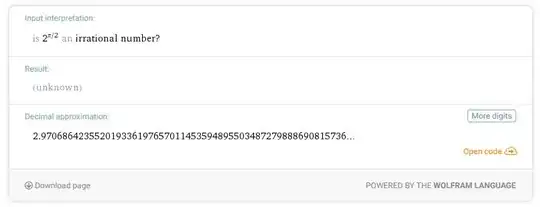Problem
Prove or disprove that $2^{\frac{\pi}{2}}$ is an irrational number.
My Try
According to our mathematical intuition, we may want to apply Gelfond–Schneider theorem, which states that
if $\alpha,\beta$ are two algebraic numbers, where $\alpha$ dose not equal $0$ or $1$ and $\beta$ is not a rational number, then $\alpha^\beta$ is a transcendental number.
But in fact, it can't work here, because $\beta=\dfrac{\pi}{2}$ here is not an algebraic number at all, which doesn't satisfy the premise of the theorem.
Besides, I have tested this on WolframAlpha. It outputs the consequence as follows
Now, how to go on?
